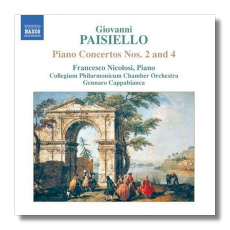
The Internet's Premier Classical Music Source
Related Links
- Latest Reviews
- More Reviews
-
By Composer
-
Collections
DVD & Blu-ray
Books
Concert Reviews
Articles/Interviews
Software
Audio
Search Amazon
Recommended Links
Site News
 CD Review
CD Review
Giovanni Paisiello

Piano Concertos
- Piano Concerto #2 in F Major
- Piano Concerto #4 in G minor
- Sinfonia d'Opera
- Proseperine: Overture in D Major
Francesco Nicolosi, piano
Collegium Philarmonicum Chamber Orchestra/Gennaro Cappabianca
Naxos 8.557031 DDD 54:35
Neapolitan composer Giovanni Paisiello's greatest claim to fame is that his version of The Barber of Seville predated Rossini's, and was considered the better of the two at the time. In fact, the première of Rossini's version was a notorious scandal, engendered in no small part, it seems, by the mischief of Paisiello's supporters, who were out in full force that night. Posterity has given Rossini the laurels, not just for The Barber of Seville, but as an overall master. Today, Paisiello is a minor figure, although his operas, instrumental works, and choral music still get an airing from time to time. He was born in 1740 (or 1741) and died in 1816.
His eight piano concertos are among the works that get such airings. They are in the mold of Haydn's and Mozart's works in this genre, and their workmanship is excellent, even if they lack the genius one associates with the aforementioned composers. There are some lovely moments – for example, the Largo of the Concerto in G minor, whose bejeweled melancholy is reminiscent of Mozart. The concluding Rondo has a "split personality" as it alternates between minor-key pathos and major-key vivacity.
The booklet notes say not one word about the cheerful five-minute Sinfonia which opens the CD. Again, it is very much in the style of Haydn and Mozart. Proserpine is one of Paisiello's forgotten operas, and its overture is one of those multi-movement productions that were common during that era. (Even so, it lasts less than six minutes!)
Nicolosi plays this music sparklingly on a modern piano, and the booklet notes go to some length praising his technique and stylistic accomplishments! The Collegium Philarmonicum Chamber Orchestra is comprised of musicians from the San Carlo opera house in Naples; the strings are wiry, but the group sounds alert and well-rehearsed, so kudos to Cappabianca. The recording was made in the theater of the Caserta Palace, a venue where Paisiello's music was known to have been performed two centuries ago.
Copyright © 2004, Raymond Tuttle



















